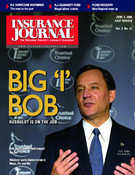While Massachusetts debates reforms to slow the exit of auto insurers writing within its borders and Connecticut develops a plan to lure more insurance jobs back to its insurance capital, New Hampshire is going the tax cut route.
Lawmakers have passed and sent to Gov. John Lynch a plan to cut in half the state’s 2 percent tax on insurance premiums over the next four years, making it the lowest in the New England and mid-Atlantic states.
The reduction will save domestic insurers on the taxes they pay to New Hampshire but they stand to save even more–an estimated $3.6 million–in so-called retaliatory taxes they pay to other states in which they do business.
While the original version had called for the tax to be cut immediately, the final compromise would phase in the lower levy over a four-year period: 1.75 percent effective July 1, 2007, 1.50 percent effective Jan. 1, 2009, 1.25 percent effective Jan. 1, 2010 and 1.00 percent effective Jan. 1, 2011.
This change is expected to reduce premium tax revenue to the state by $2.3 million in fiscal year 2008, $4.0 million in 2009, $8.6 million in 2010 and $10.5 million in 2011. It applies to all life and property/casualty insurance premiums.
Recoup revenues
However, the state hopes to make up lost tax revenues by attracting insurers and jobs. The state should also recoup funds through its own retaliatory tax provision that requires an insurer domesticated in another state with a rate higher than New Hampshire’s rate to pay the higher rate on New Hampshire premiums.
That same provision in other states has meant that N.H.-chartered insurers have had to pay 2 percent in states with rates lower than that. Once the lower N.H. rate is in effect, they will no longer have to pay that extra amount in those other low tax states.
An Ernst & Young report prepared for the industry and the insurance department on the original proposal estimated that the state could recoup as much as 65 percent of the lost tax revenues. The net effect would be a $4.6 million loss in state revenues but a $2.1 million gain in local revenues, Ernst & Young found.
The same report said the tax cut would produce 750 new insurance jobs (639 in property/casualty) and another 731 insurance-related jobs over several years from increased activity by current N.H.-based insurers and others redomesticating to the state.
The report also advised lawmakers what could happen if they did nothing. “If New Hampshire does not reduce its premium tax, it risks losing ground even when standing still because of insurance tax reforms underway in other states; the state will lose approximately 100 insurance jobs because of recently enacted and future scheduled rate reductions in other states,” the report stated.
The Granite State has seen a decline in jobs and the number of insurance firms operating in the state, according to economist Dennis Delay.
In 1999 there were 13,542 private employees in New Hampshire insurance industry. By 2004, that number was down about 600 jobs. In 1998 there were 811 private insurance firms; down to 774 in 2004.
Between 1999 and 2003, three companies redomesticated out of New Hampshire to lower tax states; one to Nebraska and two to South Carolina. These included Jefferson Pilot and National Grange.
One of the companies welcoming the tax move is Keene-based Peerless Insurance, a New Hampshire-chartered subsidiary of Liberty Mutual.
Peerless watching
Mike DiRusso, general counsel for Peerless, said the company expects to save $2.5 million a year in retaliatory taxes alone, a figure that grows every year. He said Peerless would have to “seriously consider” redomesticating to a lower tax state if New Hampshire did not act because the retaliatory taxes are sizable.
DiRusso thinks the change gives the state “one heck of a product here to sell” to the insurance industry when the tax rate is considered along with the business climate.
New Hampshire Insurance Commissioner Roger Sevigny is preparing a plan to monitor the tax cut’s effects and attract new insurance jobs. He said he would be setting up meetings with representatives form the insurance industry to solicit ideas on where to go from here and have a report ready by Sept. 30.
Stressing there are no guarantees, Sevigny confirmed that Acadia Insurance Company, now a Maine domestic, has indicated an interest in redomesticating to the state if the tax rate is lowered.
He aid he’d also be happy to keep Peerless in the state.
George Roussos, lobbyist for the New Hampshire Association of Domestic Insurance Companies, sees the tax move as a step toward restoring what used to be a much bigger part of the state’s economy.
Roussos thinks the key is getting the word out and that the state and Sevigny have a good story to tell now that it sports the lowest tax rate in East. He commended Sevigny for his efforts in streamlining regulation
He said CEOs cite the premium tax rate and the regulatory environment as two top factors in deciding where to charter operations. “We’ve got both of those,” Roussos said.
“This is an opportunity to create more jobs” he added. “It would be a real win if we got a few companies.”
As for whether Gov. Lynch is as enthusiastic as the industry and will sign the tax measure, nobody claimed any inside information on his views but Roussos was optimistic.
“I’d be surprised if he didn’t support it,” Roussos said. “The governor has been supportive of economic development.”
Was this article valuable?
Here are more articles you may enjoy.


 Allstate CEO Wilson Takes on Affordability Issue During Earnings Call
Allstate CEO Wilson Takes on Affordability Issue During Earnings Call  AIG, Chubb Can’t Use ‘Bump-Up’ Provision in D&O Policy to Avoid Coverage
AIG, Chubb Can’t Use ‘Bump-Up’ Provision in D&O Policy to Avoid Coverage  After Falling 6% in 2025, Average Auto Insurance Cost Will Stabilize in 2026, Says Insurify
After Falling 6% in 2025, Average Auto Insurance Cost Will Stabilize in 2026, Says Insurify  Chubb CEO Greenberg on Personal Insurance Affordability and Data Centers
Chubb CEO Greenberg on Personal Insurance Affordability and Data Centers 


